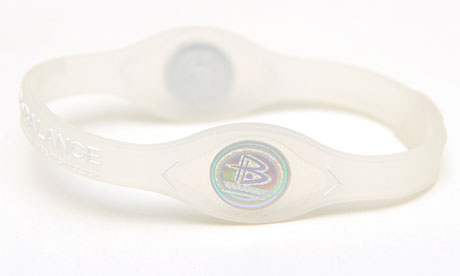
Have you heard the one about the bracelet with holograms that can improve your strength and flexibility, or help you lose weight? Did you know that sperm was highly nutritious and something to be reabsorbed into the body, particularly before a fight?
For the past 12 months a range of celebrities have endorsed and promoted a whole range of scientifically dubious ideas. Fortunately, for anyone concerned that people might take the celebrity nonsense seriously, scientists and doctors are on hand to dispense some corrective wisdom on the dodgiest of these claims.
The campaign group Sense About Science (SAS) has collated scores of examples of scientific abuse from the past year and today publishes its annual list of celebrity-science shame. "When people in the public eye give opinions about causes of disease, cures, diets, or products we should buy or avoid, that's it, their opinion goes worldwide in seconds," said Lindsay Hogg, assistant director of SAS. "It gets public attention and appears in every related Google search for months. So if it's scientifically wrong, we're stuck with the fallout from that."
This year saw the biggest rise in dubious ideas among celebrities about the way our bodies work, said the campaigners. Olivia Newton-John, for example, told a newspaper in the summer that she took extra digestive enzymes and "plant tonics" to boost her immune system. Pop star Sarah Harding, meanwhile, extolled the virtues of sprinkling charcoal on to her meals to Now magazine, as a way of absorbing the "bad, damaging stuff" in the body.
"All the digestive enzymes you need are produced in a beautifully co-ordinated way by different structures in your gut," said Melita Gordon, consultant gastroenterologist at Royal Liverpool University hospital. "They work best at the exact location where they are produced. Your body makes all the enzymes you need, in the right place, at the right time."
Writer and chemist John Emsley pointed out that, although charcoal was known to absorb toxic molecules when used in gas masks and in sewage treatment, it was unnecessary when it comes to diet because the body is already quite capable of removing any "bad, damaging stuff" it encounters in ordinary consumption. "It might help prevent any smelly farts, though."
Placebo effect
SAS also pointed to several examples of sports stars, actors and even Spanish government ministers endorsing Power Balance, a silicone bracelet that contains a hologram. David Beckham, Kate Middleton, Robert de Niro and Formula One driver Rubens Barrichello have all made positive noises about the device, according to SAS.
Greg Whyte, a sports scientist at Liverpool John Moores University, said Barrichello's claim that he felt and performed better when he exercised wearing the bracelet was not surprising. "Over time physical training enhances oxygen transport and consumption, and increases muscle mass and range of motion," he said. "Any perceived enhancement to his performance from wearing the Power Balance bracelet is likely to be a placebo effect, as he expects to feel a change."
Cage fighter Alex Reid took things much further with his tips for health this year. Giving his fans advice on how to prepare for a match, he told the Sun: "It's actually very good for a man to have unprotected sex as long as he doesn't ejaculate. Because I believe that all that semen has a lot of nutrition. A tablespoon of semen has your equivalent of steak, eggs, lemons and oranges. I am reabsorbing it into my body and it makes me go raaaaahh."
John Aplin, a reproductive research scientist at the University of Manchester, said that sperm cannot be reabsorbed once formed in the testes. "In fact sperm die after a few days, and the nutritional content of the ejaculate is really rather small. And it's worth remembering that unprotected sex might result in pregnancy or the passing on of a sexually transmitted infection."
The favourite of sceptics everywhere, homeopathy, also makes an appearance. Julia Sawalha told the Daily Telegraph earlier this year: "I don't get inoculations or take anti-malaria tablets when I go abroad, I take the homeopathic alternative, called 'nosodes', and I'm the only one who never goes down with anything."
Jayne Lawrence, chief scientific advisor at the Royal Pharmaceutical Society, said Sawalha had been fortunate in not getting malaria, as there was no active ingredient in homeopathic treatments that would have protected her against the disease.
Voice of reason
The SAS roundup is not universally critical of celebrities, however, citing Jennifer Aniston as a voice of reason. When reports emerged that she was apparently on a baby-food diet, Aniston told People magazine: "Sorry, but the last time I had baby food, I believe I was one. I've been on solids for about 40 years now."
The campaigners also highlighted the enduring themes of celebrity science. The first is the all-too-common claim that a product is "chemical-free" – everything is made from chemicals, SAS points out. And the second theme, especially prevalent at this time of year, is that "detox" is good for you. Detox is a marketing myth, said SAS – human bodies can remove their own toxins without the need for "pricey potions and detox diets".
"We have thousands of scientists who are willing to look at claims about medicine and science," said Hogg. "We'd like to see more celebrities checking out the science before they open their mouths and send the wrong thing viral."

